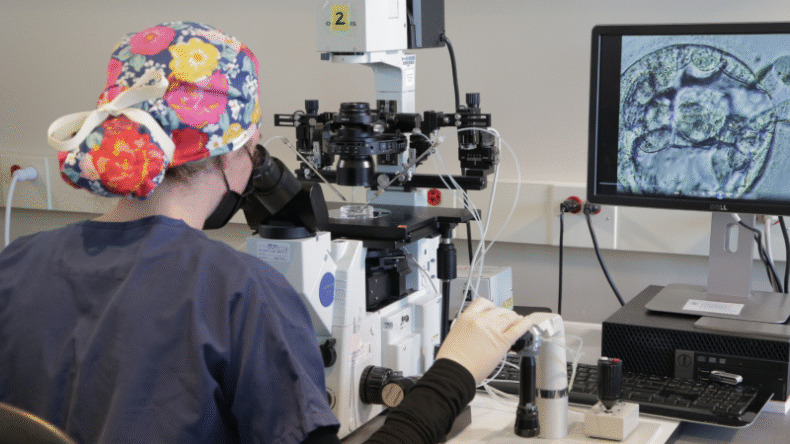Medically reviewed by Alexandra Mott, M.Ed., Ed.S., LPC, PMH-C, therapist at CCRM Greenville, SC
Those in the thick of infertility or pregnancy loss may find it to be a challenge all year round, but during the holiday season, the struggle to have a baby can feel amplified. All the extra family gatherings this time of year brings can feel triggering, plus, it can be difficult to get into the seasonal spirit if you’re not exactly feeling merry or bright.
It’s okay to feel these emotions and even dread this time of year, but there are a few ways to make it…dare we say… bearable? Read on for our advice on how to cope with infertility during this festive time of year, and how to avoid some of the sore spots — and how CCRM Fertility can help.
1. Avoid triggers
Child-centric events and activities are everywhere right now, but the more you know where to look for them, the more equipped you are to handle them. Make a conscious effort to be aware of places and events that could stir up negative feelings, whether that’s shopping malls, social media, or seeing holiday cards with photos of pajama-clad families (maybe your partner can be on card-opening duty this year?). Focus on what you can control, like say, for example, watching movies or videos that bring you joy instead of doom-scrolling on Instagram.
2. Be selective about parties and invites
It’s okay to turn down invitations and gatherings if social events are impacting you in a negative way. If you know you can’t tolerate a kid’s birthday party, a work happy hour, or a gender reveal or baby shower right now, try to let go of the guilt and pressure to attend. Extend a thank you for the invite and gently explain to the host why you can’t make it. If you’re open about your fertility journey, you can express how certain events are not helpful for you at this moment in time; otherwise, keep it vague and leave out the details. If there are events you do genuinely want to attend, go, but devise an exit strategy ahead of time.
3. Come prepared with responses
Inevitably you’ll run into someone this month who’s a bit more curious than you’d like. They’ll ask those complex questions about when you’re going to have kids or offer unsolicited advice on how to conceive because this one thing worked for their neighbor’s friend’s sister. Decide ahead of time how open you want to be about your fertility struggles and rehearse your responses to these inquiries. Above all else, remember you have a right to say as little or as much as you feel comfortable sharing.
Sometimes a response as simple as, “I don’t want to talk about that right now,” and “what worked for someone else might not work for me” or sarcastically quipping, “wow, what great advice!” can help get the point across and change the subject.
4. Indulge in self-care
Prioritizing your physical, emotional, and overall well-being is imperative, especially on a fertility journey. Eating healthy, sleeping well, and exercising are lifestyle habits that benefit everyone, but additionally, try to schedule in some “you” time over these next few weeks to do what fills your cup: Read a good book, binge a TV show, visit the spa or acupuncturist, or meet a supportive friend for lunch.
Additionally, consider scheduling a date with your partner, if you have one; reconnecting and focusing on each other rather than your appointments or treatment will feel nice for a change. Also, exchanging gifts, decorating your home together, and starting new traditions may help reinforce your bond while taking your mind off of infertility.
5. Find a support system
Infertility can feel isolating, but you don’t need to go at it alone. Leaning on others can help you cope, whether it’s your partner, family or friends, or online support groups where you’ll meet people who’ve had similar experiences. Therapy can also be beneficial if you’re struggling to manage emotions associated with infertility or loss. Many therapists specialize in fertility issues, and some of our CCRM Fertility clinics—including CCRM Chicago, IL, CCRM Lone Tree, CO, and CCRM Greenville, SC—have social workers on site who can help guide you through your treatment.
6. Seek out world-class fertility care
Whether you’re looking for a second opinion or just starting to consider your family-building options, you’ll want to choose a fertility care team who you can trust. CCRM Fertility’s network of world-renowned reproductive endocrinologists offers personalized care and proven results to help you build your family faster. And we’re here to help you every step of the way.
To book a new patient consultation with a fertility specialist at your nearest CCRM location, click here.

California’s SB 729 Mandate and Fertility Treatments: What to Know
A new mandate signed into California law guarantees IVF coverage for those...

How CCRM Fertility Maximizes IVF Success Using PGT-A for Embryo Selection
Preimplantation genetic testing for aneuploidy, or PGT-A, screens embryos created through in vitro fertilization (IVF) to see...

What Is Pregnancy Loss? Causes, Symptoms, & Treatment Options
For some women and couples struggling with infertility, getting pregnant isn’t the...

California’s SB 729 Mandate and Fertility Treatments: What to Know
A new mandate signed into California law guarantees IVF coverage for those under their large group, fully insured health

How CCRM Fertility Maximizes IVF Success Using PGT-A for Embryo Selection
Preimplantation genetic testing for aneuploidy, or PGT-A, screens embryos created through in vitro fertilization (I

What Is Pregnancy Loss? Causes, Symptoms, & Treatment Options
For some women and couples struggling with infertility, getting pregnant isn’t the issue, but staying pregnant is. Whe





